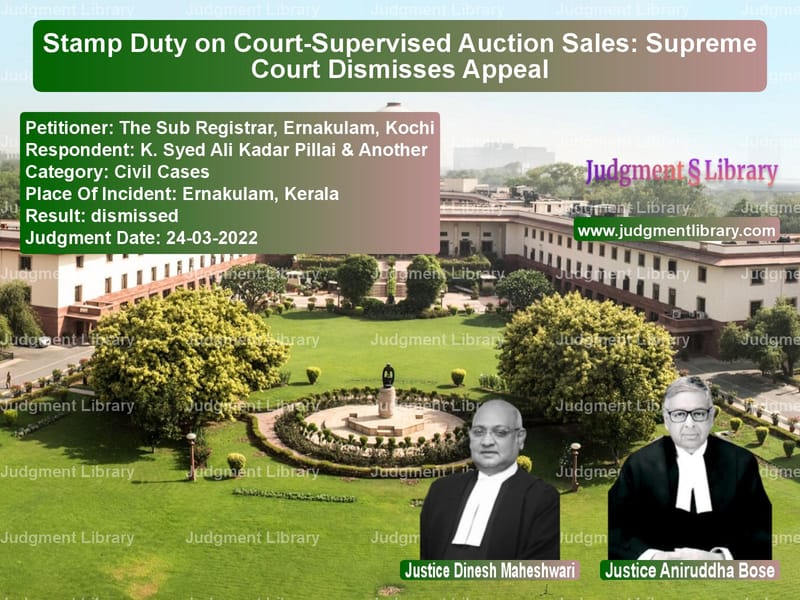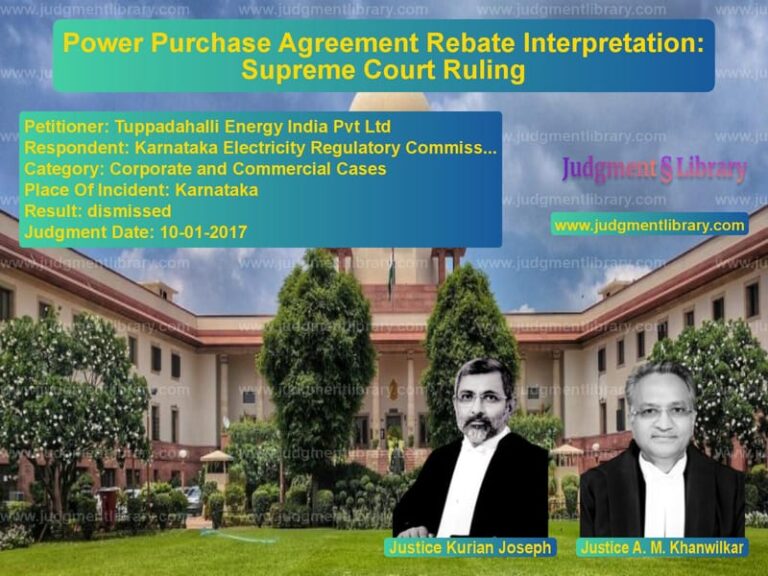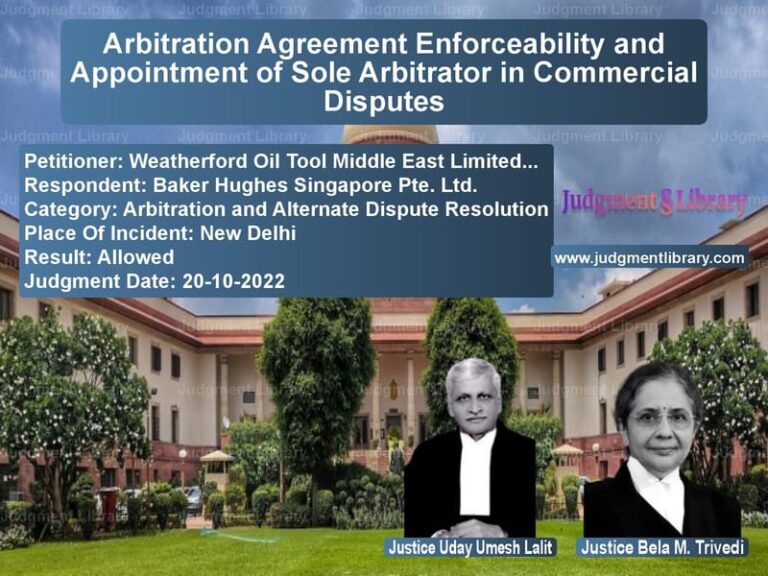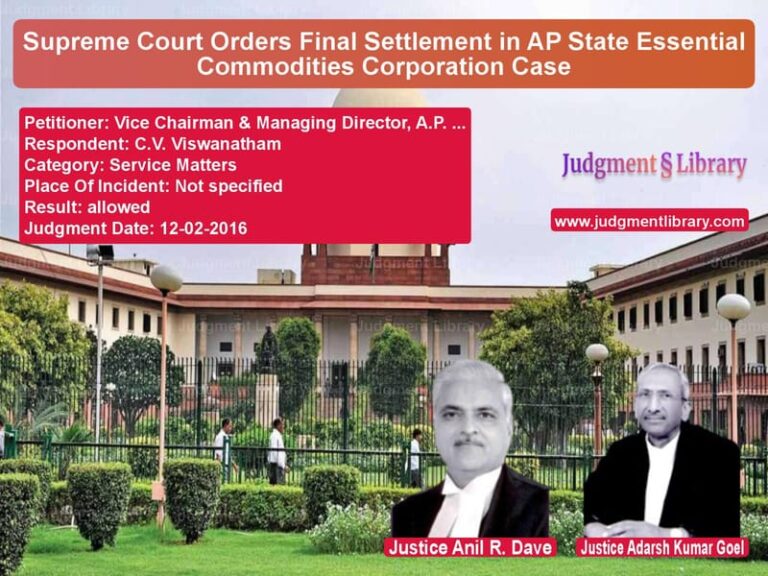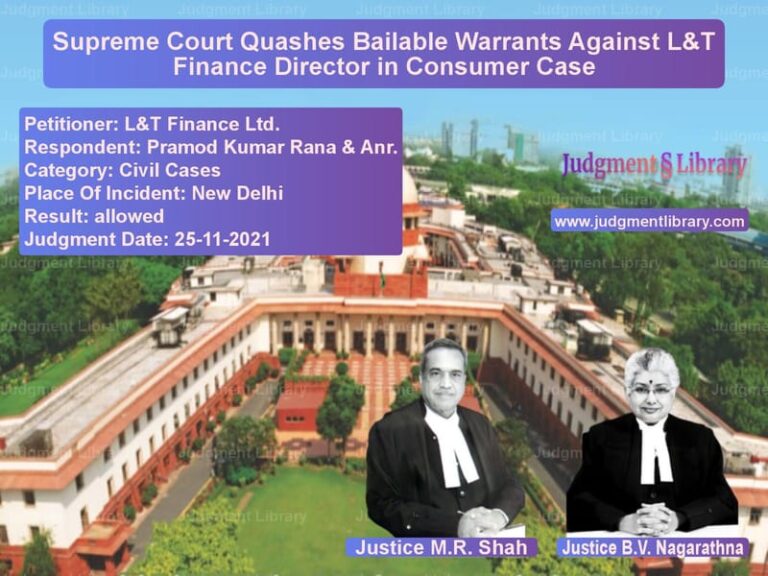Stamp Duty on Court-Supervised Auction Sales: Supreme Court Dismisses Appeal
The Supreme Court of India recently delivered an important judgment in the case of The Sub Registrar, Ernakulam, Kochi vs. K. Syed Ali Kadar Pillai & Another, which clarified the applicability of stamp duty on properties sold under the supervision of the Company Court. The ruling affirmed that the valuation of such properties, once approved by the Company Court, should be considered final for the purpose of calculating stamp duty.
Background of the Case
The case arose from a dispute over the stamp duty payable on a property auctioned under the supervision of the Company Court. The respondents, K. Syed Ali Kadar Pillai & Another, had purchased assets through an auction process where their bid amounted to Rs. 1.935 crores. However, the Company Court had fixed the value of the immovable property at Rs. 1.4 crores for stamp duty purposes.
The District Registrar accepted this valuation, but the Sub Registrar, Ernakulam, later demanded stamp duty based on the auction price instead of the Company Court’s valuation. This led to litigation between the buyers and the stamp duty authorities.
On April 2, 2008, the High Court ruled in favor of the buyers, affirming that stamp duty should be levied on the Company Court’s valuation of Rs. 1.4 crores, not the auction bid amount. Dissatisfied with this decision, the Sub Registrar appealed to the Supreme Court.
Key Legal Issues Considered
- Whether stamp duty should be charged based on the auction price or the Company Court’s valuation.
- Whether the Sub Registrar had the authority to challenge the valuation fixed by the Company Court.
- The extent of judicial interference in tax assessment when transactions occur under judicial supervision.
Petitioner’s Arguments (Sub Registrar, Ernakulam)
- The auction bid amount, not the Company Court’s valuation, should be used to calculate stamp duty.
- The District Registrar’s acceptance of the Company Court’s valuation was erroneous.
- The High Court erred in setting a precedent where courts could determine stamp duty rates.
Respondent’s Arguments (K. Syed Ali Kadar Pillai & Another)
- The auction process was conducted under the supervision of the Company Court, making its valuation final.
- The Sub Registrar lacked authority to reassess or challenge the valuation fixed by the Company Court.
- Acceptance of the auction bid amount for stamp duty would be unjust and contrary to legal precedents.
Supreme Court’s Observations
- The Court observed that the sale took place under the Company Court’s supervision, ensuring transparency and fairness.
- The Company Court had explicitly determined the value of the immovable property at Rs. 1.4 crores.
- The District Registrar had accepted this valuation, meaning no further assessment was necessary.
The Court stated:
“We find no reason to interfere in the impugned judgment dated 02.04.2008, particularly in view of the facts that the sale in question took place under the supervision of the Company Court and even when the auction bid of the respondent had been Rs. 1.935 crores for the assets under sale, the Company Court had fixed the value of immovable property therein at Rs. 1.4 crores; and the District Registrar was also satisfied with that valuation. Therefore, stamp duty was to be collected only on the said valuation.”
Final Judgment
- The Supreme Court dismissed the appeal, upholding the High Court’s ruling.
- The Company Court’s valuation of Rs. 1.4 crores was deemed final for stamp duty assessment.
- The Sub Registrar’s demand for a higher stamp duty based on the auction bid was quashed.
Key Takeaways from the Judgment
- Company Court’s valuation is binding: Properties auctioned under judicial supervision must have their stamp duty calculated based on the court-approved valuation.
- Limits on stamp duty reassessment: Revenue authorities cannot challenge valuations fixed by judicial orders unless specific laws allow reassessment.
- Protecting auction buyers: The ruling ensures that buyers in court-supervised auctions are not unfairly taxed based on their highest bid.
- Judicial finality in valuation: The judgment reinforces that valuation decisions made by courts must be respected by tax authorities.
Conclusion
The Supreme Court’s ruling in this case upholds the principle that judicially supervised auctions should not be subjected to arbitrary tax assessments. The decision provides clarity on stamp duty laws and ensures that auction buyers are taxed fairly based on court-approved valuations rather than fluctuating bid amounts.
Petitioner Name: The Sub Registrar, Ernakulam, Kochi.Respondent Name: K. Syed Ali Kadar Pillai & Another.Judgment By: Justice Dinesh Maheshwari, Justice Aniruddha Bose.Place Of Incident: Ernakulam, Kerala.Judgment Date: 24-03-2022.
Don’t miss out on the full details! Download the complete judgment in PDF format below and gain valuable insights instantly!
Download Judgment: the-sub-registrar,-e-vs-k.-syed-ali-kadar-pi-supreme-court-of-india-judgment-dated-24-03-2022.pdf
Directly Download Judgment: Directly download this Judgment
See all petitions in Property Disputes
See all petitions in Landlord-Tenant Disputes
See all petitions in Contract Disputes
See all petitions in Damages and Compensation
See all petitions in Legal Malpractice
See all petitions in Judgment by Dinesh Maheshwari
See all petitions in Judgment by Aniruddha Bose
See all petitions in dismissed
See all petitions in supreme court of India judgments March 2022
See all petitions in 2022 judgments
See all posts in Civil Cases Category
See all allowed petitions in Civil Cases Category
See all Dismissed petitions in Civil Cases Category
See all partially allowed petitions in Civil Cases Category

